A Conversation With Dan Simmons
by Claire E. White
Many authors have the dream of writing in multiple
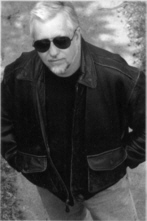
|
Born in East Peoria, in 1948, Dan Simmons graduated from Wabash College with a B.A. in English and a Phi Beta Kappa award for creativity in writing and art. He became an elementary teacher after earning a master's degree from Washington University in St. Louis, in 1971. For the next ten years, Simmons worked in the field of education, eventually helping to develop a highly successful gifted education program. During that time, he wrote short stories and submitted them to various magazines. In the early eighties, Simmons told his wife that if he didn't receive encouragement at a Denver writer's conference, he would quit trying for professional publication and devote more time to his teaching career. At the conference, SF legend Harlan Ellison singled him out at a workshop and told him that he must not stop trying to get published, that his writing showed real talent. Ellison then asked permission to enter Simmons' short story, "The River Styx Runs Upstream," in a contest for beginning writers. Simmons won the contest, and publication, in 1982. Three years later, his first novel, Song of Kali (Tor,1990), won a World Fantasy Award. Simmons has been writing professionally full-time ever since.
Since then, he has published numerous short story collections and novels, including Prayers to Broken Stones (Bantam Spectra), Summer of Night (Warner), Children of the Night (Warner), Phases of Gravity (Bantam Spectra), The Hollow Man (Bantam Spectra), Carrion Comfort (Warner), Fires of Eden (Putnam), The Crook Factory (Avon) and Darwin's Blade (Morrow). But it was the publication of the bestselling Hyperion Cantos -- Hyperion, The Fall of Hyperion, Endymion and The Rise of Endymion (all, Bantam Spectra) -- which firmly secured Simmons' fame as a science fiction luminary.
The structure of Hyperion is patterned after The Canterbury Tales, with six different traveling pilgrims alternately telling his or her story as the group makes its way across the galaxy to the planet Hyperion to meet a dangerous and mysterious entity known as the Shrike. The book owes much to the romantic poet John Keats; Keats' life and poetry are an important theme in the books. Hyperion also tackles other important themes, such as religion, mythology, resurrection, love, betrayal and death. Hyperion mixes several popular subgenres of SF -- space opera, cyberpunk, alternate history and others -- and can serve as a sort of literary survey of the genre for someone who is unfamiliar with SF in general. Critically acclaimed, the Hyperion Cantos helped gain much respect and love for SF as a genre, even for those who had never had much interest in it.
Now Dan Simmons has turned his hand to the classic hardboiled detective novel with his latest release, Hardcase (St. Martin's Press). Hardcase tells the story of ex-con p.i., Joe Kurtz, who after being released from prison goes about putting his life and career back together. His first case is for Don Farino, a mafia boss whose accountant has gone missing. As Kurtz tries to track the missing number cruncher, he finds out that quite a few people have vested interest in seeing him fail. The body count is high, the pacing is fast, and the writing is lean and gritty.
As with all the best teachers, Simmons is passionate about his favorite subjects. He truly loves writing, and has a tremendous work ethic, which he believes is important for young writers to embrace if they ever want to be a success. His output is prodigious, and he always has book, short story and film projects in the works. He lives in Colorado with his wife, Karen, and their daughter, Jane. Dan spoke with us about his new novel, Hardcase, how he got his big break, and why "aspiring" writers should just give up.
When you were a boy, were you interested in books and writing? What did you like to read?
I knew that I wanted to be a writer even before I knew exactly what being a writer entailed. As a youngster, I was the Tom Sawyer of the group -- the boy providing the imaginary framework for our play, giving the backstory for the toy soldiers in the sandbox, deciding on the names of the characters we played in our backyard adventures. By third grade, I was writing Timmy McBrown: Boy Detective stories on narrow-lined paper and secretly handing them around the classroom. (Even at that age, I knew that one was not a real writer without an audience.) In fourth grade, I typed out my first science fiction story on old Underwood upright. In fifth grade, I wrote and circulated an elaborate sequel to The Wizard of Oz (not knowing that Frank L. Baum had already done the same.) Occasionally these stories were intercepted by the teacher and I was scolded for wasting time. Thank God for that response! Writing, I'm convinced, should be a subversive activity -- frowned on by the authorities -- and not one cooed over and praised beyond common sense by some teacher. I learned to read early -- although it was not a household in which people read much (my older brother was a voracious reader, but he had already left home by the time I began decoding words and sentences) -- and I read everything I came in contact with: my mother's Readers Digest condensed books, comic books, a few SF magazines (Astounding) that my brother had left around, and whatever real books came into my hands. The Dick and Jane readers in my parochial school first grade were a delight -- but once again I got in trouble, this time with the nuns (don't mess with nuns in 1954!), for borrowing and reading second and third grade reading books. In third grade, I was finally taken to a library because of my interest in rocks -- I checked out eleven books on rocks that day -- and after that, there was no turning back. Still today, if I pick up a copy of Tom Sawyer, I remember exactly where I was when I first read it -- my parents' back bedroom in the old house in Des Moines, leaf shadow from the big elms dancing on the screen, the breeze blowing in from the forest preserve.
How did you first get interested in teaching?
I first became interested in teaching during my junior year
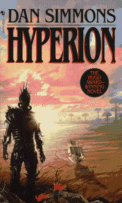
|
What did you enjoy most about being a teacher?
I loved almost everything about being a teacher, but I was an unusual teacher. I spent 12 years as a sixth-grade teacher, but had the freedom -- undreamt of today -- of closing my doors and teaching almost whatever I wanted, as long as my kids did well on standardized achievement tests. I paid for this testing myself, conducting it in September and May. As long as my sixth graders showed an average improvement of five years, the principal and district pretty much left me alone to create my own curriculum and teach whatever I wanted. So I did.
My last four years were spent creating, coordinating, and teaching an incredible gifted/talented program called APEX -- which amounted to running university and post-graduate level classes for students from 4th to 6th grade. We never used the term "gifted" or considered hunting for IQ -- we simply set up a revolving series of these incredibly advanced classes, opened application to any of the 15,000 or so students in the district, and tested specific skills for each course. We built it and they came -- identifying themselves through interest and specific abilities. The program was based on the "multiple intelligences" research of Howard Gardner and Robert Sternberg. After I left teaching in 1987, the district -- of course -- eventually killed APEX. Actually, a fat, stupid superintendent in triple-knit polyester killed it, shortly before the district discovered his sexual escapades and had to buy up his contract for $200,000. But APEX stayed dead, denying quality programming to thousands of kids.
What led up to your first novel being published?
My first novel, Song of Kali, was written during
| "Anyone who spends his or her life reading inside just one genre is an idiot." |
Was there anyone who really inspired you, or who you feel helped you pursue your dream of being a novelist?
No one inspired me to write, but writer Harlan Ellison terrified me into getting published. This meeting at a writers' workshop -- I had just given up hopes of getting published when I attended the workshop as a sort of swan song and met Harlan -- has become somewhat the stuff of legend. What he said then was rather beautiful and profound -- that very few wannabe writers actually hear the music, but for those few who do, the music has to be followed. He also pointed out to the congregated hopeful writers that what he had bestowed upon me was not so much an anointment as a curse -- a curse of being a writer that would devour my time for the rest of my life, disrupt my marriage and family life, and -- as soon as a modicum of success was reached -- bring an endless scourge of hangers-on and sycophants wanting to use me for their own ends. He was right about all of that, but also about the true joy of writing full-time.
I'd like to first talk about your award-winning Hyperion series. When you first started writing Hyperion, did you realize at the time that it would span so many books, and so long a time period? Or did you write Hyperion originally as a stand-alone novel?
I wrote Hyperion and its second-volume The Fall of Hyperion
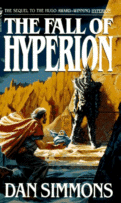
|
Beyond that, the Hyperions were my first foray into long-form SF, a genre I'd read and loved for years. When I finished The Fall of Hyperion, I knew that there was much of the large canvas yet unfinished, but I waited another four years until writing the bookend volumes, Endymion and The Rise of Endymion. Since I hate endless sequels that provide diminishing returns for the reader, I've vowed that these will be the last novels ever set in the still-fecund Hyperion universe.
From a structural standpoint, the book features alternating stories of the seven pilgrims who are journeying to Hyperion to petition the Shrike. How did you decide to use this structure to the story? Were there any of the stories which were more challenging to write than the others?
The structure of Hyperion was Chaucer-esque to allow each of the pilgrims (actually six of the seven) to tell their backstories. (This odd structure is the reason that none of the screenwriters hired to this point to adapt Hyperion have figured out how to tell it -- but then, they haven't asked me.) In truth, the structure served my deeper purpose of celebrating SF as a genre, writing in different styles from cyberpunk to Jack Vancian space opera. I could do this because the two Hyperion books are actually one large novel in two volumes. The Fall of Hyperion also had a complex multi-tiered structure, but was a much more conventional narrative.
Hyperion could certainly be read by someone without a literary background, but having such a background enables one to get all the inside jokes and references, such as who certain characters were named after. For example, readers who don't know who Fanny Brawne or Silenus were, or what a lamia is will miss some great subtext. Certainly, it wouldn't hurt to have a nice background in Romantic poetry, especially with a knowledge of Keats. Do you think that SF and fantasy today are generally "dumbed down" for the reader, in books or in films?
| "To those writers out there who may not be published yet, the advice is so simple that it may be useless -- keep your sights high, your ambitions in line with your discipline, and never accept the quality of what you're producing now as the final word. It has to be better. Even after you're published, it has to be better. Keep improving or get out of the way of those writers who hear the music and who are willing to pay a lifetime of dues to get where they want to be." |
Movie SF is, by definition, dumbed down -- there have only been three or four SF movies in the history of film that aspire to the complexity of literary SF. But with books, readers have access to a full-range of sophistication and quality in their reading. If they read dumbed down SF or fantasy, it's their choice to dumb themselves down.
The Catholic Church and organized religion in general both come under heavy fire in the series. How have your religious views changed over the years?
The Catholic Church is not attacked in the Hyperion Cantos. The future Church in these books (and the Pax civil arm of the Church) are not the church of today, but a future version in which temporal power is seized once again by the Church's ability to grant literal immortality. As for "organized religion" not being treated well -- I never understand that phrase; what religions aren't "organized?" What's the alternative -- someone in nearby Boulder, Colorado, sitting in front of his crystal or pyramid, soaking up its powers?
I love "organized religions" and there are scads of them in the Hyperion novels -- ranging from the re-vitalized (but totally corrupted) Catholic Church to the mystery cult of the Shrike Cult to the environmentalists' excess of the Templars who worship the Book of the Muir to the successful new revealed religion of our messiah and hero, Aenea. Even her movement -- charismatic in the true sense of the word -- becomes "organized" by the end of the book.
One of the first characters to tell his tale in Hyperion is the priest, based a bit on Teilhard de Chardin, and he suffers a terrible crucifixion, over and over again, rather than allow the cruciform to bring actual resurrection to his Church -- preferring the Church based on the promise of Christ rather than to have it thus corrupted by controlling the secret to immortality. Readers and reviewers tend to ignore that this early touchstone of Teilhard, with his prescient 1950s view of the entire planet becoming a melded "noosphere" tied together by electronics, is precisely the evolutionary epistle preached by Aenea.
 The Shrike. An 8' 6" tall cast aluminum and steel sculpture of the Shrike by sculptor Clee Richeson stands outside Dan Simmons' home. |
The Shrike itself is, to say the least, a very mysterious and compelling character. What was your inspiration for the Shrike? Did your thoughts about the Shrike change in any way from your original impressions of the character?
My first glimpse of the Shrike ("le Gritche" in French) came in the winter of 1971 and I described it in an epic poem I was writing for fun. That image solidified in 1972 when I first told a wandering fantasy tale to the fourth-graders I was teaching (in Washington, Missouri, where I taught for year). I told that story again some years later to sixth-graders in Colorado --a half hour a day for 182 days! -- and while they loved a lot of the characters, it was the Shrike that compelled their imagination most deeply.
Hardcase and Hyperion are totally different books, of course, yet Brawne Lamia's story in Hyperion had elements of a harboiled p.i. novel (although set in a futuristic world, of course). Did you enjoy writing Brawne's story? Did it ever make you want to delve into the p.i. world? (I always thought she was worthy of her own detective series!)
Brawne Lamia's tale in Hyperion was my first celebration of the Chandleresque, Hammettesque narrative tone and it was fun to connect that honored tradition to the wildly futuresque world(s) of the World Web in the Hyperion universe. I knew even before Brawne's tale that I'd like to try a novel with the noir, PI protocols and tropes someday.
I'd like to talk about your latest book, Hardcase. How did this book come about? What attracted you to this genre?
Hardcase was written over a period of two months in the year 2000 when I took a break from a particularly difficult (and personal) novel I was writing, A Winter Haunting. It's one of the strangest attributes of this profession that when we writers get exhausted writing one thing, we relax by writing another. After finishing Hardcase, I returned to another 10 months of working on the other novel, but felt rather renewed.
The "hero" of Hardcase is Joe Kurtz. What was your inspiration for Joe; how did he come into being?
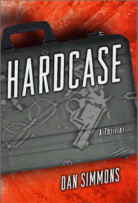
|
Joe's secretary, Arlene, is quite intriguing. We're never quite sure why she's so loyal to Joe, but it says a lot about his character that she is. Did you intend to make this relationship the anchor of the book or did it just evolve as you wrote?
I don't know the source of secretary Arlene's loyalty to Joe Kurtz -- she drops what she's doing and returns to working for him after he's been in Attica for twelve years and he never contacted her once all that time, or knew that her husband had died -- but there's a lot about Kurtz and Arlene that I don't understand yet. Like most characters I enjoy reading about (much less writing about), the two people are real enough to have large chunks of their lives and motivations hidden from me. Part of the pleasure of writing Hard Freeze, the second Joe Kurtz novel (due for publication in the summer of 2002), was in seeing a few more details of the relationship between Kurtz and Arlene, and a glimpse -- very quick and limited -- of what motivates them. When my editor at St. Martin's suggested with Hardcase that I "get into Joe's mind more and see what makes him tick" I responded with a loud and sincere "Never!" I don't want to be in the mind of someone like Kurtz and never will, but I do enjoy -- and hope the readers will enjoy -- getting these glimpses of what motivates the man and connects him, however fragilely, to the rest of mankind.
There is a lot of both violence and even a quiet, subtle humor in Hardcase. Is that a difficult mix to achieve? How did you feel about writing such a hard-edged thriller?
It's odd how violence and humor so often go together, isn't it?
| "Writing in different genres requires wildly different mindsets -- and also wildly different approaches in research, style, plotting, characterization, use of dialogue, and narrative. Just because John Updike can write a good "Updike novel" with all of its sinful suburban goings-on doesn't mean that he could write a serious SF novel if his life depended on it." |
What was the most challenging aspect of writing this novel?
The most challenging aspect of writing Hardcase was going over the top the way the story does without losing the willing suspension of disbelief required from the reader. But, of course, this is also the central challenge of several of the genres I write in -- SF, horror, and thrillers.
With Hardcase, you are sure to pick up another demographic of readers entirely; those that love detective fiction. Will we be seeing more of Joe Kurtz?
I wish I were "sure to pick up another demographic of readers entirely" with Hardcase, but, of course, there's no such certainty at all. All I can ensure with publication of these Joe Kurtz novels is that I will be judged by readers of such PI fiction and that I'll be leaving the safe harbor of those readers who might have enjoyed my work in SF or horror or historical suspense fiction and who might give me the benefit of the doubt in a new novel. As someone who reads in genres and who admires good writing in genres (or anywhere else), I know how properly unforgiving readers can be when they sense that an author is slumming -- moving into the genre without really knowing its conventions and qualities. It happens all the time when "serious authors" move into SF, write some ponderous theme-heavy dystopian novel that's been done better a hundred times by writers in the genre, and don't even know that they've been caught slumming. I do trust that readers of the Kurtz books will see that I admire the quality writing in the field.
You have written in so many genres. How do you prepare to switch genres? When you sit down to write your next book, do you have to get into a different mindset to write a gritty p.i. story than when you write SF?
Writing in different genres requires wildly different mindsets -- and also wildly different approaches in research, style, plotting, characterization, use of dialogue, and narrative. Just because John Updike can write a good "Updike novel" with all of its sinful suburban goings-on doesn't mean that he could write a serious SF novel if his life depended on it. Genres aren't ghettos -- or shouldn't be (too often they accept that fate) -- but they are like different species of animals on a complex evolutionary tree; they have adapted and refined their own ecological niche, with their own evolved protocols, tropes, themes, shortcuts, and histories.
Has the fact that you can write in so many different genres caused any difficulties with your publishers? I would imagine that after The Rise of Endymion was released, your publisher must have wanted you to write another sequel or start another SF series?
I promised myself more than 20 years ago that if I were
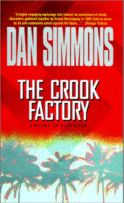
|
But then, there are only a few publishers left in this cutthroat business at the beginning of the 21st Century and I'm running out of places to jump.
You once stated that, "All good writers are serious readers." How important is it for a young writer to have a good grounding in classic literature? When reading genre fiction, should young writers read outside the genre in which they wish to write?
Anyone who spends his or her life reading inside just one genre is an idiot. (Imagine a baby who will eat only strained carrots and who grows up to be an adult, still eating strained carrots. Very, very sad.) The biggest problem I find with young would-be writers is the limited scope of their education and ambition. John Gardner, whose On Becoming a Novelist is required reading for anyone who dreams of being a writer, points out that anyone who wants to write fiction for publishing is presuming to join a dialogue of ideas that goes back millennia and that to be ignorant of what has come before in that dialogue is self-defeating arrogance. These same wannabe-writers doom themselves by looking at the lowest common denominator of writing in the genre they've staked out and proclaiming -- "I can write better than that!" Well, so what? Better than crap is still crap in all too many cases. Unask the question, as the Zen teacher would say. The question is not "Who can you write as well as?" but "Who is the best writer you could never hope to equal?" That's the writer you need to aspire to being, to hope to compete with even though you know that hope is doomed to failure. (Hemingway's notebooks and letters are filled with boxing metaphors -- "Today I took on Tolstoy and went three rounds with him!") No one will ever be a great writer by thinking that he can someday write as well as, say, Stephen King or Dan Simmons.
What is your advice to aspiring writers?
My advice to aspiring writers? -- "Give up! Turn back! It's hopeless!"
Now that's my advice to aspiring writers, since it doesn't take any discipline or effort or guts to aspire to something. To hell with aspirants. Let the poseurs quit aspiring and creep back to their jobs at Blockbuster. To those writers out there who may not be published yet, the advice is so simple that it may be useless -- keep your sights high, your ambitions in line with your discipline, and never accept the quality of what you're producing now as the final word. It has to be better. Even after you're published, it has to be better. Keep improving or get out of the way of those writers who hear the music and who are willing to pay a lifetime of dues to get where they want to be.
What's next for Dan Simmons?
In 2001 I finished A Winter Haunting (scheduled for publication in February, 2002) and Hard Freeze (scheduled for publication
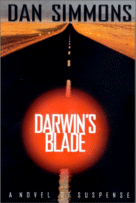
|
Right now, in August of 2001, I'm just beginning a large and stylistically difficult SF novel called Ilium -- due to my publisher, Harper Collins, in February of 2002 -- and am contracted to continue writing on the second-volume of this epic, Olympos. These two books will deal with themes from the Iliad in the same way that I borrowed central themes (and titles!) from John Keats for the Hyperion Cantos, but will also include stylistic and thematic elements from Nabokov's novel Ada: Or Ardor and quite a few other sources.
Because of my long-lasting love of film and filmmaking (it's how I met my wife Karen shooting films in inner city Philadelphia in 1969 and how I got involved with teaching), I stay involved with different projects slouching toward Bethlehem . . . er, Hollywood . . . to be born, including optioning my Hemingway novel The Crook Factory to some exciting people, acting as consultant for the TV adaptation of Darwin's Blade, writing my own screenplay adaptation of A Winter Haunting, discussing interest in Hardcase and the Joe Kurtz franchise, and being actively involved as the four Hyperion novels are considered for development for the screen.
As I answer these questions - in August of 2001 - I'm coughing from a serious bout of pneumonia and sobered by an article I read yesterday in which William Manchester admits that he's too ill after two strokes to finish the long-awaited third volume of his brilliant biography of Winston Churchill. He says that "When will the third volume be out?" is the second most frequently asked question he gets (right after -- "Can I send you my manuscript?", which all of us get from these aspiring writers) and now he can answer them -- "Never."
This is tragic to me. It makes me so sad I truly want to weep. William Manchester seems like a good man, kind, intelligent, but for years I've had one question for him -- "When will the third Churchill volume be out?" As a reader, that's what I care about. What sadder thing than to be a writer, to have one's identity shapes as a writer, and to know that one's writing days are over.
So I make all these plans for new projects, but I know how tentative all human planning is and creative planning above all. I'd probably trade the writing of most of these books (not all, but most) just to get a chance to read Manchester's third volume of the Churchill biography, but that's not a choice now for either one of us. So I can't say these novels and screenplays of mine will be written. Like the sea captains of yesterday and today, I'll never write in my log that I'm going to these far ports, only that I'm bound for them.
But perhaps I do have some advice for aspiring writers after all. In an old sketchbook and common day book on my desk here there is a quote from the first lines of Chaucer's The

|
And beneath that I've scrawled a quote from Horace- - "Dimidium facti qui coepit habet: sapere aude: Incipe -- " ("To have begun is to be half done; dare to know; start!")
Sapere aude!
Return to the September 2001 issue of The IWJ.
More from Writers Write
